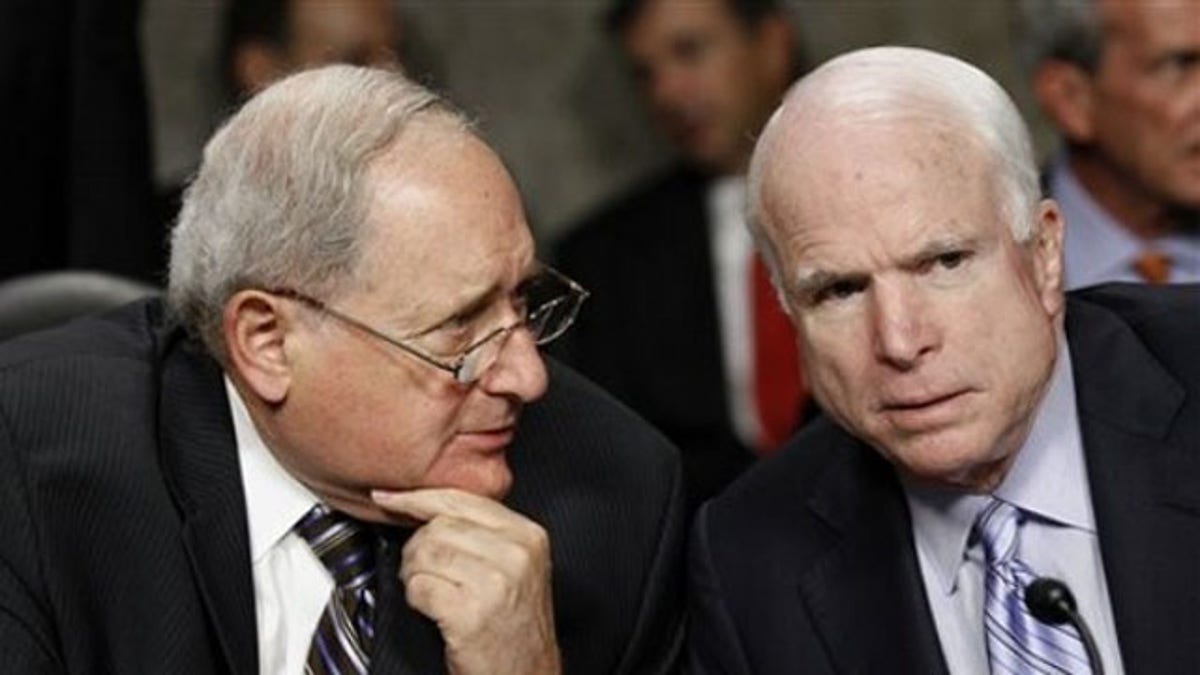
Senate Armed Services Committee Chairman Sen. Carl Levin, left, talks with the committee's ranking Republican Sen. John McCain on Capitol Hill Aug. 3. (AP Photo)
The U.S. military is being muddied in the trench as Democrats and Republicans fight a tug-of-war over social issues timed weeks before Election Day.
What should have been a routine budget bill for the Pentagon is now a political cauldron brimming with proposed policy changes over abortion, gay rights and illegal immigration. Senate Democrats have folded, or attempted to fold, all those issues into a single defense package, leading to accusations that the Senate is needlessly politicizing its annual obligation to fund the military.
As the parties hurl political hand grenades at one another, stuck in the crossfire is the military itself.
Joe Davis, spokesman for the Veterans of Foreign Wars, said Congress will avoid a Pentagon shutdown, as it always does, by passing a resolution to continue funding defense at current levels.
But he expressed concern about the "attachments" to the authorization bill.
"The United States military does not exist to serve as a control group for social experiments," Davis said.
The defense bill has become a flashpoint at the intersection of three distinct debates in the culture wars.
The package includes a repeal of the "don't ask, don't tell" policy barring gays from serving openly in the military, a change in policy which the VFW opposes. Top military officials including Defense Secretary Robert Gates and Joint Chiefs Chairman Adm. Mike Mullen support an eventual repeal but want Congress to wait until the Pentagon finishes its review.
The bill also includes a repeal of the law barring abortions at U.S. military hospitals overseas, which even some pro-choice advocates have a problem with if it means federal funding for abortion services.
Lastly, Senate Majority Leader Harry Reid plans to propose an amendment for the so-called DREAM Act, which would give some young illegal immigrants a pathway to citizenship if they go to college or join the military.
Democratic leaders are pushing these changes but question whether they have the votes and acknowledge the entire package probably won't come up for a verdict until after the November election.
"I don't know whether we have the votes or not," Sen. Carl Levin, D-Mich., chairman of the Senate Armed Services Committee, said Monday -- ahead of a scheduled vote Tuesday to open debate.
Despite the bleak prospects for any substantive movement on the bill and its controversial components, it has touched off a firestorm of finger-pointing in Washington, with interests representing each side of one of the three social issues accusing somebody of stonewalling.
The Human Rights Campaign, a gay rights group, took out a full-page newspaper ad last week calling for Congress to repeal "don't ask, don't tell." The group this week accused "anti-equality senators led by John McCain" of threatening to filibuster.
Gay Republican groups also in favor of the repeal put the blame in Reid's corner.
GOProud executive director Jimmy LaSalvia accused Reid of jeopardizing the "don't ask don't tell" vote by allowing language on immigration and abortion.
"Harry Reid should stop using gay soldiers as political pawns in a cynical attempt to win votes for his re-election and keep his liberal special interests happy," LaSalvia said in a written statement Monday.
Conservatives have accused Reid of needlessly politicizing the debate, particularly with the addition of a DREAM Act vote. Senate Republicans on Monday said the majority leader was at the same time limiting debate on the bill and other amendments.
"The Senate has traditionally considered the defense legislation for a week or more, allowing for robust debate and careful consideration of scores of amendments. This year, the majority leader has indicated his intent to limit debate and block all amendments to the bill except three that he has personally handpicked," Sen. Jeff Sessions, R-Ala., said in a statement.
"In doing so, he is ignoring the clear wishes of the American people and demonstrating that Washington remains deeply out of touch with everyday Americans," he said.
One conservative military group, while weighing in heavily against a "don't ask, don't tell" repeal, accused Reid of putting the military on the chopping block.
"Sen. Reid's addition of these controversial, non-germane measures demonstrates his pursuit of political agendas and election-year politics at the expense of our military men and women," The Center for Military Readiness said in a memo Monday.
The defense bill is one of the top orders of business on Capitol Hill before Congress adjourns for the remainder of the campaign season.
Reid needs 60 votes Tuesday to start debate. If he reaches that, he would still need to corral 60 votes on any amendment that is filibustered. And then he would need 60 votes again to shut down a filibuster preventing final passage, before moving onto the final vote.




